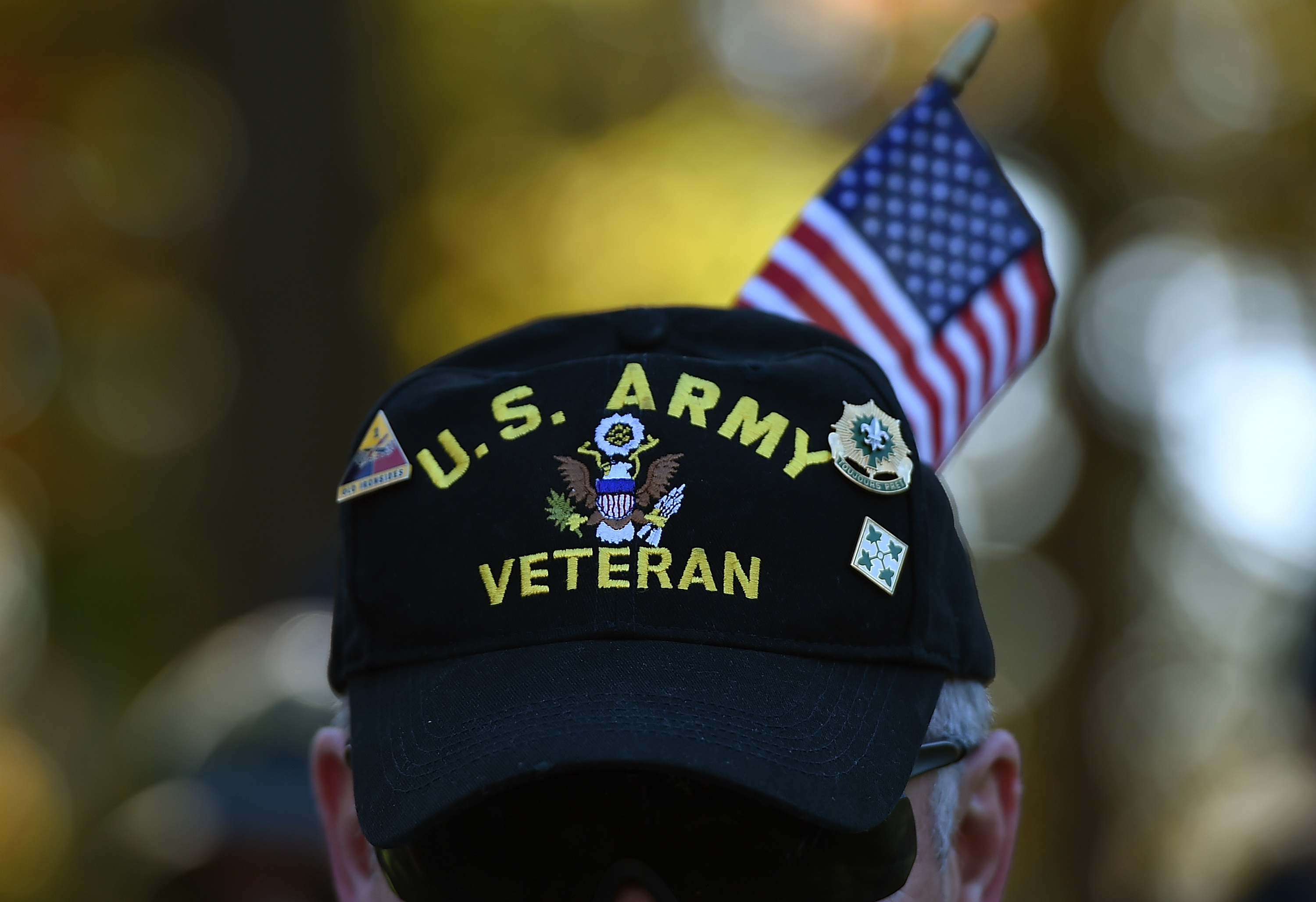Evie Fordham | Politics and Health Care Reporter
Post-9/11 veterans are the first generation of U.S. vets who find it harder to afford housing than their civilian peers, according to a study by Apartment List.
Although veterans are more likely to own a home than non-veterans, and vets are less likely to be housing cost-burdened than non-vets, the youngest generation of vets is struggling, the study found.
“Post 9/11 veterans have become the the first and only generation of veterans to struggle with housing affordability compared to civilians of like ages and demographics,” according to the study.
Iraq War veteran Derrick Anthony (L) of Quad Cities, IA, greets fellow Purple Heart recipient and WWII veteran and POW Jerry Wolf of during the National Purple Heart Day Ceremony at George Washingtons Mount Vernon August 7, 2017 in Mount Vernon, Virginia. Chip Somodevilla/Getty Images
Post-9/11 veterans are nearly 5 percent less likely than their civilian peers to afford their housing costs “even when controlling for age, race, gender, and location,” according to the study.
That is a significant change from Vietnam and even Gulf War veterans. Vietnam vets are 10 percent more likely to be able to afford their housing costs while Gulf War vets are 25 percent more likely when compared to their non-military peers, according to the study. (RELATED: These Are The Best Five Cities For Veterans To Live: Report)
Post-9/11 vets are also less likely than older vets to own their own home, the study found.
The studys findings come even as veterans do have access to Veterans Affairs loans to grant them affordable mortgages as well as related programs to put vets on the path of higher education or fight vet homelessness.

Gulf War veteran Bill Virill, retires U.S. Army, attends a Veterans Day ceremony at the Vietnam Veterans Memorial November 11, 2014 in Washington, DC. Win McNamee/Getty Images
Another study looking at younger vets found a continued increase in suicide rates for veterans ages 18 to 34. The suicide rate for younger veterans “jumped” from 40.4 suicide deaths per 100,000 in 2015 to 45 per 100,000 in 2016, according to the Veterans Affairs National Suicide Data Report cited by The Wall Street Journal.
Other studies like an early November Wallet Hub report examined what cities are most veteran-friendly in terms of categories like the economy, jobs and quality of life.
Austin, Texas, is the best city for veterans to settle down, but Scottsdale, Arizona, and Colorado Springs, Colorado, are also great options, according to a Wallet Hub report.
Follow Evie on Twitter @eviefordham.
Send tips to [email protected].
Content created by The Daily Caller News Foundation is available without charge to any eligible news publisher that can provide a large audience. For licensing opportunities of our original content, please contact [email protected].
Evie Fordham | Politics and Health Care Reporter
Post-9/11 veterans are the first generation of U.S. vets who find it harder to afford housing than their civilian peers, according to a study by Apartment List.
Although veterans are more likely to own a home than non-veterans, and vets are less likely to be housing cost-burdened than non-vets, the youngest generation of vets is struggling, the study found.
“Post 9/11 veterans have become the the first and only generation of veterans to struggle with housing affordability compared to civilians of like ages and demographics,” according to the study.
Iraq War veteran Derrick Anthony (L) of Quad Cities, IA, greets fellow Purple Heart recipient and WWII veteran and POW Jerry Wolf of during the National Purple Heart Day Ceremony at George Washingtons Mount Vernon August 7, 2017 in Mount Vernon, Virginia. Chip Somodevilla/Getty Images
Post-9/11 veterans are nearly 5 percent less likely than their civilian peers to afford their housing costs “even when controlling for age, race, gender, and location,” according to the study.
That is a significant change from Vietnam and even Gulf War veterans. Vietnam vets are 10 percent more likely to be able to afford their housing costs while Gulf War vets are 25 percent more likely when compared to their non-military peers, according to the study. (RELATED: These Are The Best Five Cities For Veterans To Live: Report)
Post-9/11 vets are also less likely than older vets to own their own home, the study found.
The studys findings come even as veterans do have access to Veterans Affairs loans to grant them affordable mortgages as well as related programs to put vets on the path of higher education or fight vet homelessness.

Gulf War veteran Bill Virill, retires U.S. Army, attends a Veterans Day ceremony at the Vietnam Veterans Memorial November 11, 2014 in Washington, DC. Win McNamee/Getty Images
Another study looking at younger vets found a continued increase in suicide rates for veterans ages 18 to 34. The suicide rate for younger veterans “jumped” from 40.4 suicide deaths per 100,000 in 2015 to 45 per 100,000 in 2016, according to the Veterans Affairs National Suicide Data Report cited by The Wall Street Journal.
Other studies like an early November Wallet Hub report examined what cities are most veteran-friendly in terms of categories like the economy, jobs and quality of life.
Austin, Texas, is the best city for veterans to settle down, but Scottsdale, Arizona, and Colorado Springs, Colorado, are also great options, according to a Wallet Hub report.
Follow Evie on Twitter @eviefordham.
Send tips to [email protected].
Content created by The Daily Caller News Foundation is available without charge to any eligible news publisher that can provide a large audience. For licensing opportunities of our original content, please contact [email protected].











